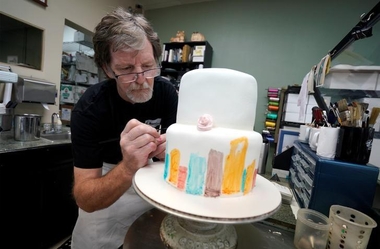Colorado baker sues governor over cake dispute with transgender woman

Yet again Colorado baker, Jack Phillips has found himself in a legal battle regarding religious freedom because he refused to make a cake for a transgender woman.
The Masterpiece Cakeshop owner became well known after he refused to make a wedding cake for a same-sex couple and won his law suit earlier this year.
The Supreme Court didn't definitely decide on that question in its ruling earlier this year, ensuring additional legal fights.
According to The New York Times, Phillips is suing the governor of Colorado for discriminating against his religious beliefs.
This time, the suit involves a customer, Autumn Scardina, who asked Phillips to make a cake with blue on the outside and pink on the inside to celebrate her birthday and the seventh anniversary of her transition.
Phillips refused because he beliefs gender is “given by God,” his lawyers told The New York Times, and “not determined by perceptions or feelings.”
The suit, filed in Denver this week, claims officials in Colorado are on a "crusade" against Phillips because he won’t make cakes for members of the LGBT+ community.
The article states, on the same day in June 2017 the Supreme Court agreed to hear the first case, the lawsuit says Scardina, a lawyer, called Masterpiece Cakeshop and requested the gender transition cake.
Then, days after the Supreme Court ruling, the state’s civil rights division issued a decision finding probable cause that state law requires Phillips to make the new cake.
Phillips feels the state's decision violates his First Amendment rights to freely exercise his religious beliefs.
In 2012, the Masterpiece Cakeshop become a topic of national discussion over religious freedom when Phillips refused service to David Mullins and Charlie Craig, gay men looking for a wedding cake for a reception in Colorado.
When he refused their business the couple filed a complaint with the Colorado Civil Rights Commission, saying that Phillips broke a state law barring discrimination based on sexual orientation.
Mullins and Craig won before the state commission and in the state courts.
However, The New York Times sated the U.S. Supreme Court ruled in Phillips’s favor, but in doing so passed on the opportunity to rule on whether a business can refuse service to LGBT+ people based on the First Amendment.
Justice Anthony M. Kennedy argued that the Colorado Civil Rights Commission was biased against religion in this case.
“The outcome of cases like this in other circumstances must await further elaboration in the courts,” he wrote.
Businesses that sell wedding services, including florists, calligraphers, photographers and videographer, are being litigated around the nation.
A few weeks ago, Justice Ruth Bader Ginsburg predicted that the issue of discrimination justified with religion might soon return to the Supreme Court.
Democratic Gov. John Hickenlooper said in an interview with Colorado Public Radio this week he supports religious freedom but it shouldn't be used to deny people services.
“I don’t think there should be bias involved of who you chose to serve and who you don’t,” he said.
However, Phillips’s lawyers, who are affiliated with the conservative Christian organization Alliance Defending Freedom, claim Colorado “is ignoring the message of the U.S. Supreme Court.”
“Jack shouldn’t have to fear government hostility when he opens his shop for business each day,” they said in a statement. “We’re asking the court to put a stop to that.”
Information provided by Julie Turkewit The New York Times.
The Gayly. 8/18/2018 @ 4 p.m. CST.





